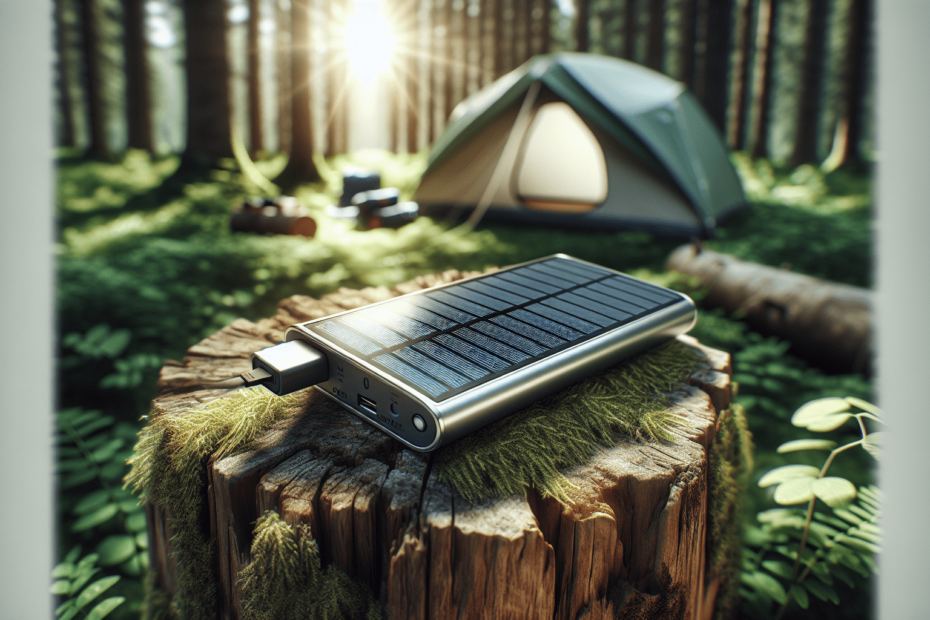When selecting a portable solar power bank for your camping trips, it is crucial to evaluate several key factors to ensure optimal performance and convenience. These factors include the power bank’s capacity, measured in milliampere-hours (mAh), which determines how many times it can charge your devices. Additionally, the solar panel efficiency is vital for effective and fast recharging from sunlight. Durability and build quality are also essential, as the power bank must withstand harsh outdoor conditions. Portability, weight, and size should be considered to ensure easy transport. Lastly, check for multiple charging ports to accommodate various devices and ensure it is compatible with your specific gadgets. By thoroughly assessing these aspects, you can make an informed decision that enhances your outdoor experience.
The article “What Are The Key Factors To Consider When Selecting A Portable Solar Power Bank For Camping Trips?” provides a comprehensive guide to help you navigate the essential considerations necessary for choosing the most suitable portable solar power bank for your outdoor adventures. Have you ever found yourself in the great outdoors, far from any electrical outlets, and desperately in need of a power source? If so, you’ve probably considered investing in a portable solar power bank. Such a device can be a game-changer on camping trips, ensuring your gadgets stay charged even when you’re miles from civilization. However, selecting the right portable solar power bank can be a daunting task given the plethora of options available in the market. What key factors should you consider? Let’s break down this question to help you make an informed decision.
Understanding Your Power Needs
Device Compatibility
What devices do you plan to charge? Are you focusing on small gadgets like smartphones and cameras, or do you also need to power larger electronics such as tablets and laptops? Understanding the power requirements of your devices is the first step in selecting the appropriate solar power bank.
Frequency of Use
How often will you be using the power bank? If you’re a frequent adventurer, you’ll need a more robust and reliable unit. Occasional campers might opt for something more budget-friendly and less powerful.
Battery Capacity
A key factor to consider is the battery capacity, typically measured in milliamp-hours (mAh). The higher the mAh rating, the more power the bank can store. For instance, a 10,000 mAh power bank can charge a smartphone approximately 2-3 times, while a 20,000 mAh unit can do so 4-6 times.
Example Table: Device Charging Estimates
| Device | Battery Size | Charges per 10,000 mAh | Charges per 20,000 mAh |
|---|---|---|---|
| Smartphone | 2,500 mAh | ~4 charges | ~8 charges |
| Tablet | 6,000 mAh | ~1.5 charges | ~3 charges |
| Smartwatch | 300 mAh | ~33 charges | ~66 charges |
| DSLR Camera | 1,000 mAh | ~10 charges | ~20 charges |
Solar Panel Efficiency
Solar Charging Speed
Solar panels’ effectiveness depends on their efficiency rating, typically expressed as a percentage. High-efficiency panels can convert more sunlight into electrical energy, reducing the time it takes to charge the power bank.
Number of Solar Panels
The number of panels can also affect charging speed. Foldable designs often come with multiple panels that can be unfolded to increase surface area, thus capturing more sunlight.
Example Table: Solar Charging Speed Estimates
| Number of Panels | Estimated Charging Time (Sunlight Hours) |
|---|---|
| 1 Panel | 20-30 hours |
| 2 Panels | 10-15 hours |
| 3 Panels | 6-10 hours |
| 4 Panels | 4-6 hours |
Durability and Portability
Material Quality
For outdoor adventures, durability is a must. Look for power banks made of rugged materials like high-grade plastic or rubberized exteriors that can withstand drops, water, and dust.
Weight and Size
Portability is another crucial factor. While larger capacity power banks usually weigh more and take up more space, modern designs offer a good balance between capacity and portability. Consider how much weight you are willing to add to your camping gear.
Additional Features
Multi-Functional Capabilities
Some power banks come with additional features like LED flashlights, compasses, and even emergency radios. While not necessary, these can be beneficial in emergencies.
Fast Charging
Fast charging technologies like Quick Charge and Power Delivery can significantly reduce the time it takes to charge your devices. Ensure that your power bank and your devices support the same fast-charging standards.
Price vs. Value
Budget Considerations
Solar power banks come in a wide range of prices. While it might be tempting to go for a cheaper option, it’s often worth investing a bit more for a reliable product that meets your needs.
Warranty and Customer Support
A good warranty and reliable customer support can save you a lot of headaches in the long run. Always check the warranty terms and read reviews about customer service before making a purchase.
Conclusion
Selecting the right portable solar power bank for your camping trips involves a careful evaluation of your power needs, solar panel efficiency, durability, portability, additional features, and budget considerations. By keeping these key factors in mind, you’ll be better equipped to find a power bank that ensures your devices stay charged, allowing you to focus on enjoying your adventures.
Remember, the goal is to find a balance between capacity, efficiency, durability, and cost that fits your specific needs. Happy camping!
